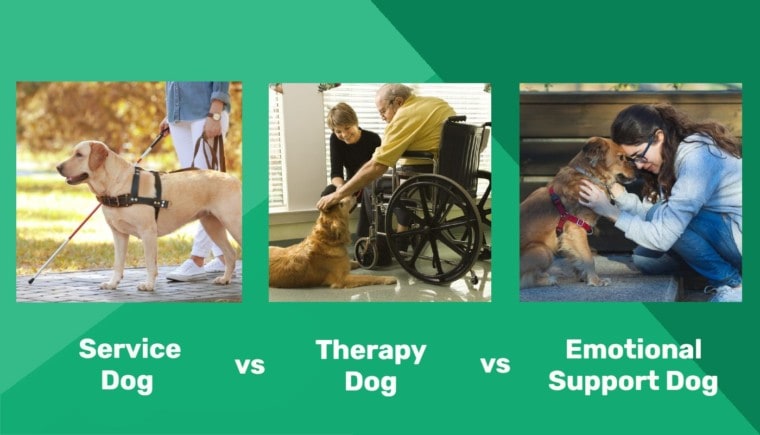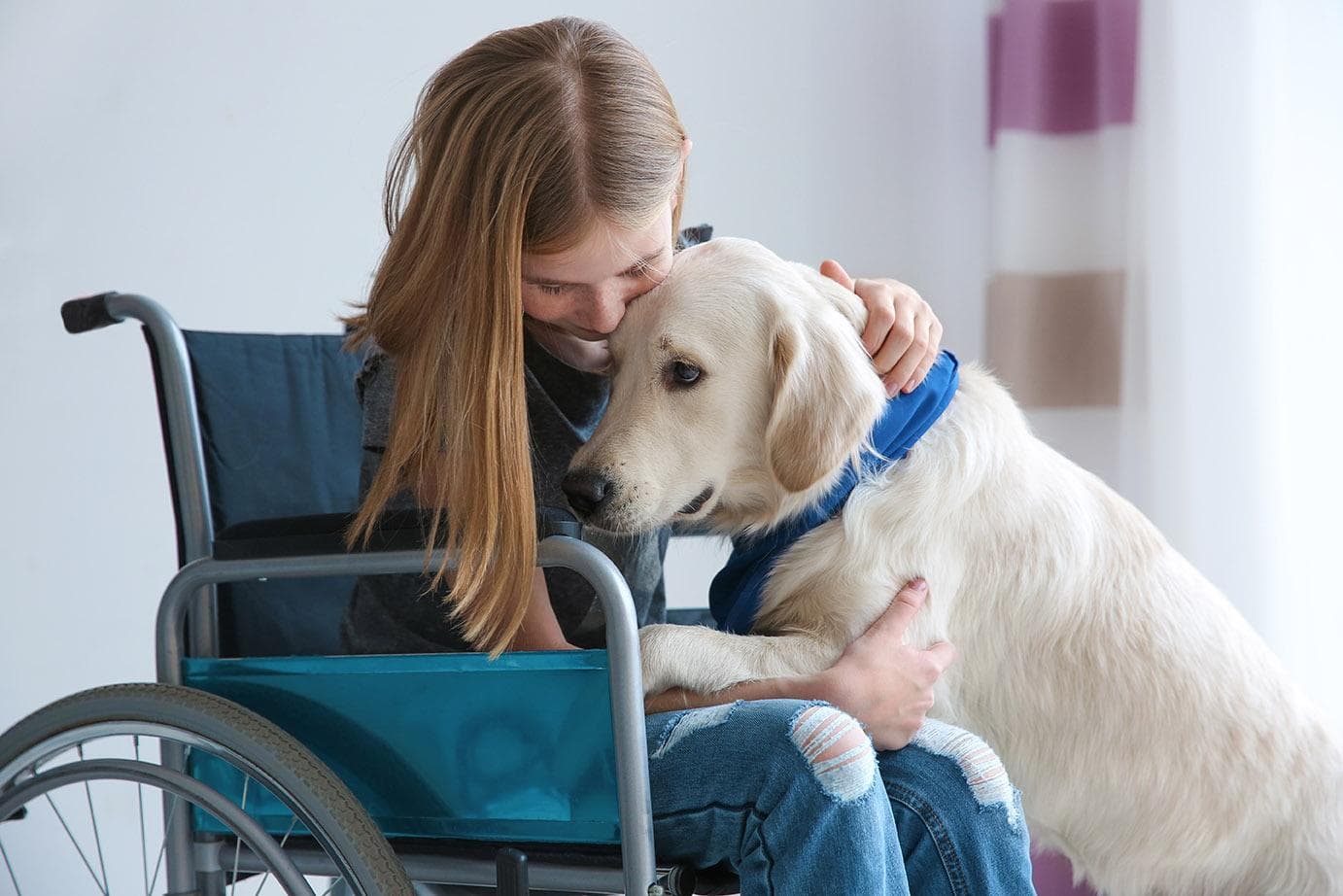
While seeing-eye dogs for the blind have been around for a long time, you might have noticed that everywhere you go, there’s a working dog in a vest performing some sort of function.
Is that dog a service dog or a therapy dog? Are they an emotional support animal? Are these all the same thing, and if not, what are the differences between them?
We go over what each type of dog does in this guide.
Service Dogs

A service dog is an animal that has been trained to help a person with a disability perform tasks that would otherwise be difficult or impossible for them.
Seeing-eye dogs are the most famous examples of service dogs, but these pups can also be trained to alert deaf owners to important sounds, recognize the signs of a seizure before it starts, or even remind their humans to take important medications. Service dogs are highly trained, and most are acquired from professional breeders who train the dog for months before allowing them to be partnered with a human.
While any breed of dog can be trained as a service animal, the most common ones are Labradors, Golden Retrievers, and German Shepherds. However, the breed is less important than whether the dog is appropriately sized for the task at hand, which is why breeds like Great Danes can be used to help push wheelchairs or Toy Poodles can be trained to sit in their owner’s lap and detect falling blood sugar levels.
“Service dog” can be a broad term, and it can encompass both emotional support animals and therapy dogs. The latter two usually don’t require the same amount of training as full-fledged service dogs, though.
Therapy Dogs

A therapy dog is a type of service animal, though they only provide comfort and support rather than perform some sort of essential physical function. There isn’t nearly as much training involved in becoming a therapy dog as there is for a service animal, and many therapy dogs are just pets who are especially friendly and supportive.
The idea behind a therapy dog is that petting or being around animals is good for mental health, as it reduces stress and anxiety levels, lowers blood pressure, and can even reduce physical pain. As a result, therapy dogs are often used in stressful situations, such as difficult psychiatric sessions, after disasters, and in hospice situations.
There doesn’t have to be anything “wrong” for people to benefit from the company of a therapy dog, however. Many therapy dogs are taken to schools and into nursing homes, where their very presence helps brighten the days of the people there.
Animal-assisted therapy has been offered to cancer patients, dementia sufferers, veterans with PTSD, and others. In most cases, the therapy dog belongs to an outside owner or organization, rather than the person being treated. Also, therapy dogs often work with groups of people, whereas a service dog is devoted to a single person at all times.
Dogs aren’t the only species used as therapy animals; cats, horses, rabbits, and even guinea pigs can also be used with good results. Animal-assisted therapy is a cheap and effective way to reduce mental suffering, with the only real concerns being sanitation issues or the possibility that an untrained therapy animal will react poorly in a stressful situation.
Emotional Support Dogs

Emotional support animals are similar to therapy dogs, except they tend to live full-time with the person who needs them. An emotional support animal may be considered a type of service dog, but they usually lack the same training that those other dogs get.
There are no real requirements involved in becoming an emotional support dog. All that’s necessary is that the dog be able to provide comfort and support to their owner. Often, an emotional support dog is a pet that the owner forms a particularly close bond with, and there’s no special training whatsoever provided.
That said, some service dogs (called “psychiatric service dogs”) do provide emotional support, but the support that they provide is much more structured. A service animal may notice the signs of an anxiety attack and rush to comfort their owner, or they could help an overstimulated person on the autism spectrum calm down safely and quickly.
Most dogs are naturally empathetic, though, so your dog may instinctively come cuddle with you if they notice you crying or showing other signs of being upset. This does not make them trained or qualify them as a service animal, however.
None of this is said to diminish the important role that an emotional support dog can have in their owner’s life, of course. Many people, such as those with depression or those suffering from the effects of PTSD, would find that their day-to-day lives would be much more difficult without their furry friends by their side.
What Legal Rights Does Each Dog Have?
As of now, service dogs are the only ones with legal protections under the Americans with Disabilities Act (ADA). Under that law, a service dog is allowed to accompany their owner anywhere that they go, including places that otherwise wouldn’t allow dogs. That includes planes, restaurants, movie theaters, etc.
The only requirements of a service dog are that they are tethered, leashed, or otherwise under control and that they are well-behaved and housebroken. Contrary to popular belief, service dogs don’t have to wear special vests or advertise their training in any way. Emotional support dogs and therapy dogs don’t have the same legal rights, and they can be barred from certain places at the establishment’s discretion.
That said, there are limitations as to what a business can ask when you enter with your dog. Under the ADA, they can only ask two questions: if the dog is required due to a disability and what tasks the dog has been trained to perform. They can’t ask about the nature of the disability or ask to see any documentation about the animal’s training or certification.
Part of being a service animal is being calm and under control in any situation, though. If you’re trying to pass your pet off as a service dog, but they’re barking, peeing on things, or otherwise misbehaving, the establishment is within their rights to ask you to control your dog or leave the premises.
It’s important to understand that service dogs provide essential and often life-saving roles in their owners’ lives, and it’s only recently that they’ve become widely accepted. If you’re trying to game the system by pretending that your pup is a service animal when they’re not, you’re doing a disservice to disabled people all over the world.

Will Businesses Discriminate Against My Emotional Support or Therapy Dog?
This will obviously vary by business, but the world is becoming more dog friendly by the day, and many places will happily welcome friendly, well-behaved pups.
Given the restrictions on what a business can ask, most places will tread carefully when inquiring about your dog. They’d rather let an emotional support dog slip through the cracks than risk a lawsuit under the ADA.
That said, they don’t have to accommodate your dog unless they’re a service animal. Many laws have been fine-tuned to remove protections for any animals besides service dogs, so most businesses are protected if they decide to kick you and your emotional support dog out.
For the most part, though, the only reason that a business will do that is if your dog is acting up. If your pup is lying there, being quiet and polite, the worst that’s likely to happen is that they’ll ask if it’s a service animal.
It’s up to you whether to be honest. If your dog is well-behaved and truly providing a valuable service—like if you run a high risk of a panic attack without them, for example—some people would say that you’re within your rights to claim them as a service animal. However, if you just like the idea of Fido being able to eat at the nicest spot in town, you really need to reconsider that idea.

Can My Dog Be a Service Dog, Therapy Dog, or Emotional Support Dog?
The short answer is yes, any dog can qualify for those roles. The bar for entry varies wildly between service dogs and emotional support or therapy dogs, however, and it’s estimated that as many as 70% of all dogs don’t have what it takes to be a service animal.
A service dog needs to be incredibly well-trained. At a minimum, they have to be housebroken and socialized well enough that they’re non-reactive around people, other animals, and new situations. You can do this training yourself, but most people get service dogs from special training facilities.
These facilities often provide certificates stating that the dog is a trained service dog, but such certification isn’t necessary under the ADA, and a certification isn’t considered proof that the dog is a service animal.
Conversely, therapy and emotional support dogs just need to be friendly (and preferably housebroken). There’s no special training involved, as the job description is just to be cute and cuddly. There’s also no special certification needed, so all you have to do is decide that your dog is emotionally necessary, and you can have an emotional support or therapy dog.

All Dogs Provide a Valuable Service, But Not All Dogs Are Service Dogs
Dogs are incredible animals, and they can be taught to do all sorts of things. While most owners would say that their lives would be incomplete without their pups, those with service animals mean it on a whole different level.
While service dogs are the highly trained superstars of the dog world, emotional support and therapy dogs provide extremely valuable services in their own right. In fact, we’re only scratching the surface of the benefits that a calm, happy pup can provide.
Regardless of whether you need a service dog, a therapy dog, or an emotional support dog, one thing is true: Your pup will be more than happy to help.
See also:
Featured Image Credit: Service Dog [Africa Studio, Shutterstock] | Therapy Dog [iofoto, Shutterstock] | Emotional Support Dog [Anagarcia, Shutterstock]









